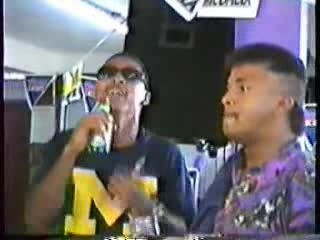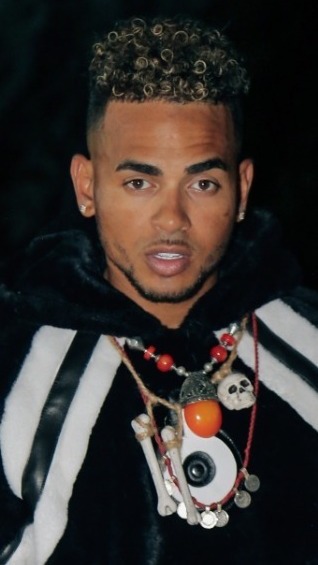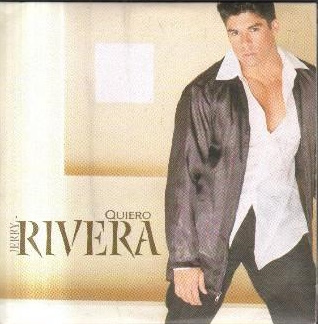
Reggaeton, is a modern style of popular and electronic music that originated in Panamá during the late 1980s, and which rose to prominence in the late 1990s and early 2000s through a plethora of Puerto Rican musicians. It has evolved from dancehall, with elements of hip hop, Latin American, and Caribbean music. Vocals include toasting/rapping and singing, typically in Spanish.

Martha Ivelisse Pesante Rodríguez, known professionally as Ivy Queen, is a Puerto Rican singer, rapper, songwriter, and actress. She is considered one of the pioneers of the reggaeton genre, commonly referred to as the Queen of Reggaeton.

The Billboard Latin Music Awards grew out of the Billboard Music Awards program from Billboard magazine, an industry publication charting the sales and radio airplay success of musical recordings. The Billboard awards are the Latin music industry’s longest running award. The award ceremonies are held during the same week as Latinfest+.

Para Ti is the ninth studio album by singer-songwriter Juan Luis Guerra and his band 4.40. It was released on August 31, 2004, by Vene Music and distributed by Universal Latin Music. It was his first studio album in six years since Ni es lo mismo ni es igual (1998) and is his first Christian-gospel inspired album. The lyrics are inspired by his conversion to Christianity and his experience of being a born again Christian. The album explores music genres from gospel and ballads to the salsa and merengue. The album was supported by the release of three official singles: "Para Ti", "Las Avispas" and "Dinteles".

"Cómo Me Duele Perderte" is a song by Cuban American singer Gloria Estefan from her ninth studio album, Alma Caribeña (2000). The song was written by Marco Flores with her husband Emilio Estefan and Roberto Blades handling its production. It was released as the album's second single by Epic Records on July 10, 2000. "Cómo Me Duele Perderte" is a salsa and bachata track that narrates the singer in pain of losing someone. The song was met with unfavorable reactions from music critics who criticized its arrangements and the singer's efforts. Commercially, the song topped the Billboard Hot Latin Songs and Tropical Airplay charts in the United States, while also peaking at number 12 on the Dance Club Songs chart in the same country and number eight in Spain. The accompanying music video was directed by Emilio, filmed in Miami, Florida, and features dramatic scenes of Estefan in front of a mirror remembering her former lover.

Toby Love is an American singer, rapper and songwriter of Puerto Rican descent. Based on The Bronx, New York, he is best known for being a former member of Aventura before pursuing a solo career, mostly known for their 2002 album We Broke the Rules, later performing a style of bachata music that combines traditional and urban singing and production. In 2006, he embarked on a solo career, thus gaining success. His debut single, "Tengo Un Amor", helped him rise to fame in mainstream Latin music. Since then, he became one of the most successful bachata artists of the 2000s and 2010s with hits like "Llorar Lloviendo", "Te Parece Poco", "Lejos", "Vestida De Blanco", among others.
Top Latin Albums is a record chart published by Billboard magazine and is labeled as the most important music chart for Spanish language, full-length albums in the American music market. Like all Billboard album charts, the chart is based on sales. Nielsen SoundScan compiles the sales data from merchants representing more than 90 percent of the U.S. music retail market. The sample includes sales at music stores, the music departments of electronics and department stores, direct-to-consumer transactions, and Internet sales of physical albums or digital downloads. A limited array of verifiable sales from concert venues is also tabulated. To rank on this chart, an album must have 51% or more of its content recorded in Spanish. Listings of Top Latin Albums are also shown on Telemundo's music page through a partnership between the two companies. As of January 26, 2017, a multi-metric methodology to compile the Top Latin Albums chart was adopted by Billboard, which also incorporates track equivalent album units and streaming equivalent album units.

Drama Queen is the seventh studio album by Puerto Rican reggaeton recording artist Ivy Queen. It was released on July 13, 2010 by Machete Music. The album was written by Queen with help from Rafael Castillo, Marcos Masis and others, while production was handled by Luny Tunes, Tainy and Noriega. The album features collaborations with De La Ghetto, Frank Reyes, Wisin & Yandel and Franco "El Gorila". It features a wide variety of musical styles in common with her previous album, Sentimiento, released three years earlier on a different label.
Tropical Albums is a record chart published by Billboard magazine. Established in June 1985, the chart compiles information about the top-selling albums in genres like salsa, merengue, bachata, cumbia, and vallenato, which are frequently considered tropical music. The chart features only full-length albums and, like all Billboard album charts, is based on sales. The information is compiled by Nielsen SoundScan from a sample representing more than 90% of the U.S. music retail market, including not only music stores and music departments at electronics and department stores but also direct-to-consumer transactions and Internet sales. A limited number of verifiable sales at concert venues is also tabulated. Innovations by El Gran Combo de Puerto Rico was the first album to reach number-one in the chart on June 29, 1985. Up until May 21, 2005, reggaeton albums appeared on the chart. After the installation of the Latin Rhythm Albums chart, reggaeton titles could no longer appear on the Tropical Albums chart. By removing reggaeton albums from the Tropical Albums chart, it opened slots for re-entries and debuts. American bachata group Aventura claimed the top spot on the Tropical Albums chart, which marked the first time since the issue dated November 6, 2004 that a reggaeton album was not at the number-one spot. The current number-one album on the chart isTodavía Me Amas: Lo Mejor De Aventura by Aventura.

Geoffrey Royce Rojas, known professionally as Prince Royce, is an American singer. At an early age, Royce took an interest in music, and in his teenage years began experimenting with music and writing poetry. By age nineteen, Royce met Andrés Hidalgo, who became his manager. Hidalgo later introduced Royce to record producer Sergio George, who immediately signed him to his label after hearing three of his demos.
Latin Rhythm Albums is a record chart published by Billboard magazine. Like all Billboard album charts, the chart is based on sales, which are compiled by Nielsen SoundScan based on sales data from merchants representing more than 90 percent of the U.S. music retail market. The sample includes sales at music stores, the music departments of electronics and department stores, direct-to-consumer transactions, and Internet sales of physical albums or digital downloads. A limited array of verifiable sales from concert venues is also tabulated. The chart is composed of studio, live, and compilation releases by Latin artists performing in the Latin hip hop, urban, dance and reggaeton, the most popular Latin Rhythm music genres. It joins the main Latin Albums chart along with its respective genre components: the Latin Pop Albums, Tropical Albums, and Regional Mexican Albums charts.

Latin music is a term used by the music industry as a catch-all category for various styles of music from Ibero-America, which encompasses Latin America, Spain, Portugal, and the Latino population in Canada and the United States, as well as music that is sung in either Spanish and/or Portuguese. It may also include music from other territories where Spanish- and Portuguese-language music is made.

Women have made significant contributions to Latin music, a genre which predates Italian explorer Christopher Columbus' arrival in Latin America in 1492 and the Spanish colonization of the Americas. The earliest musicians were Native Americans, hundreds of ethnic groups across the continent, whose lyrics "reflect conflict, beauty, pain, and loss that mark all human experience." Indigenous communities reserved music for women, who were given equal opportunities with men to teach, perform, sing, and dance. Ethnomusicologists have measured ceramic, animal-bone, and cane flutes from the Inca Empire which indicate a preference for women with a high vocal range. Women had equal social status, were trained, and received the same opportunities in music as men in indigenous communities until the arrival of Columbus in the late 15th century. European settlers brought patriarchal, machismo ideologies to the continent, replacing the idea of equality between men and women. They equated native music with "savagery" and European music with "civilization". Female musicians tended to be darker-skinned as a result of the slave trade, and contemporary society denigrated music as a profession. Latin music became Africanized, with syncopated rhythms and call-and-response; European settlement introduced harmony and the Spanish décima song form.

Juan Carlos Ozuna Rosado , known simply by his surname Ozuna, is a Puerto Rican singer, born and raised in San Juan, Puerto Rico to a Dominican father and a Puerto Rican mother. Five of his studio albums have topped the Billboard Top Latin Albums chart, with Aura (2018) charting at number seven on the Billboard 200. His musical style is primarily defined as reggaeton and Latin trap, although he has collaborated with several artists from different genres and his music takes influences from a wide variety of genres, including pop, rock, hip hop, R&B, reggae, bachata, dembow, and electronic, amongst others.
The Billboard Latin Music Award for Top Latin Album of the Year is an honor presented annually at the Billboard Latin Music Awards, a ceremony which honors "the most popular albums, songs, and performers in Latin music, as determined by the actual sales, radio airplay, online streaming and social data that informs Billboard's weekly charts." The award is given to the best performing albums on Billboard's Top Latin Albums chart, which measures the most popular Spanish-language recordings in the United States based on a multi-metric system that blends sales and album-equivalent units. The list was established by the magazine on July 10, 1993 and was originally based on album sales until February 11, 2017. From 1994 to 2007, each music genre's field had their own Album of the Year category, separated between male, female, and duo or group categories.
Urbano music or Latin urban is a transnational umbrella category including many different genres and styles. As an umbrella term it includes a wide and diverse set of genres and styles such as dancehall, dembow, urban champeta, funk carioca, Latin hip hop and reggaeton. The commercial breakthrough of this music took place in 2017 with artists from Colombia, Cuba, the Dominican Republic, Panama, Puerto Rico, the United States, Venezuela and even non-Spanish-speaking nations, such as Brazil, where Portuguese is spoken.

This article includes an overview of trends in Latin music in the 1990s, namely in Ibero-America. This includes the rise and fall of various subgenres in Latin music from 1990 to 1999.

"Quiero" is a song by Puerto Rican singer Jerry Rivera from his 11th studio album Rivera, (2001). The song was co-written by Martha Cancel, Ray Contreras, and James Nicholas Greco and produced by Bebu Silvetti. It is a pop ballad in which the singer pays homage to women. A salsa version of the track was also recorded which was arranged and produced by Ramón Sánchez. It was released in January 2001 by BMG US Latin as the lead single from the album in January 2001. A music video for "Quiero" was directed by Juan Basanta and features Rivera in various background flirting with a woman.

This article includes an overview of the major events and trends in Latin music in the 2010s, namely in Ibero-America. This includes the rise and fall of various subgenres in Latin music from 2010 to 2019.
This article includes an overview of the major events and trends in Latin music in the 2020s, namely in Ibero-America. This includes the rise and fall of various subgenres in Latin music from 2020 to 2029.

























